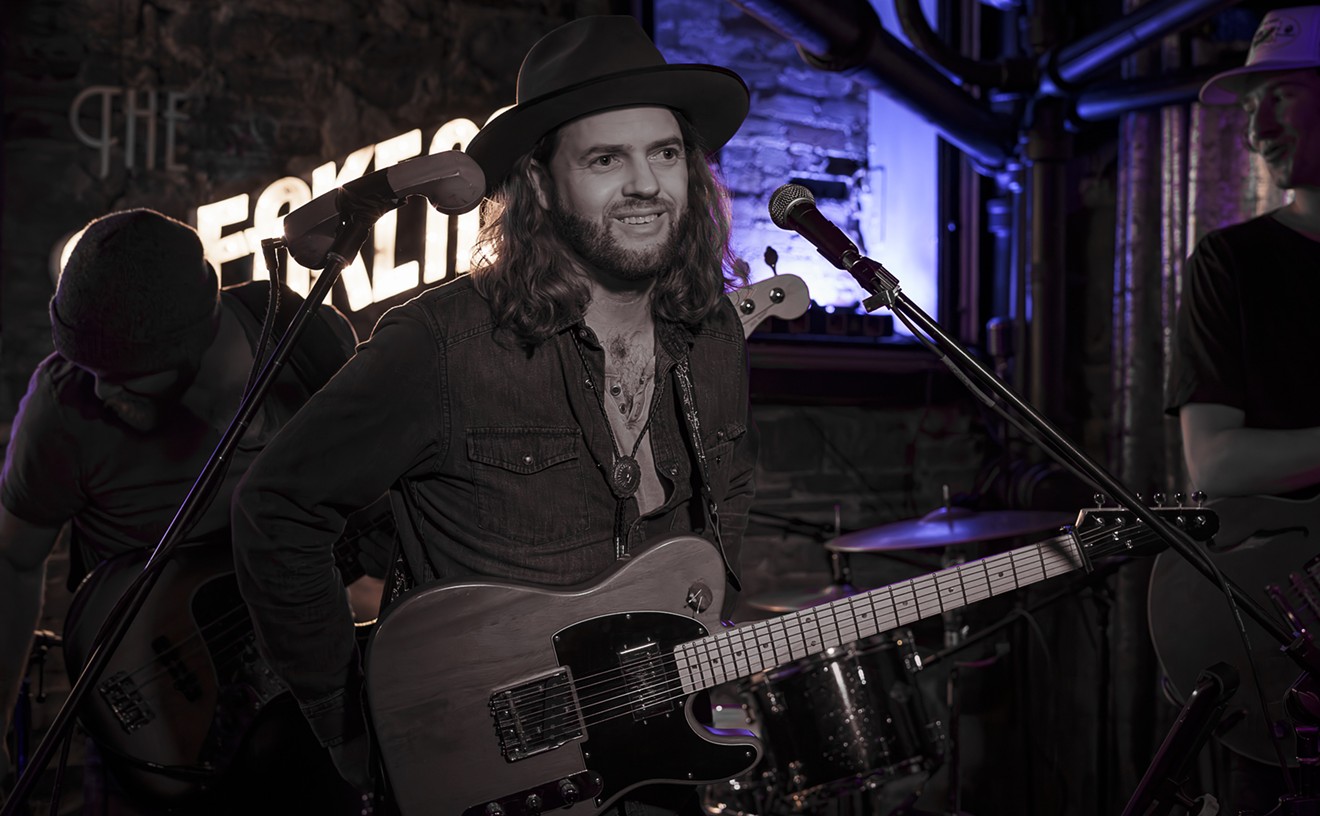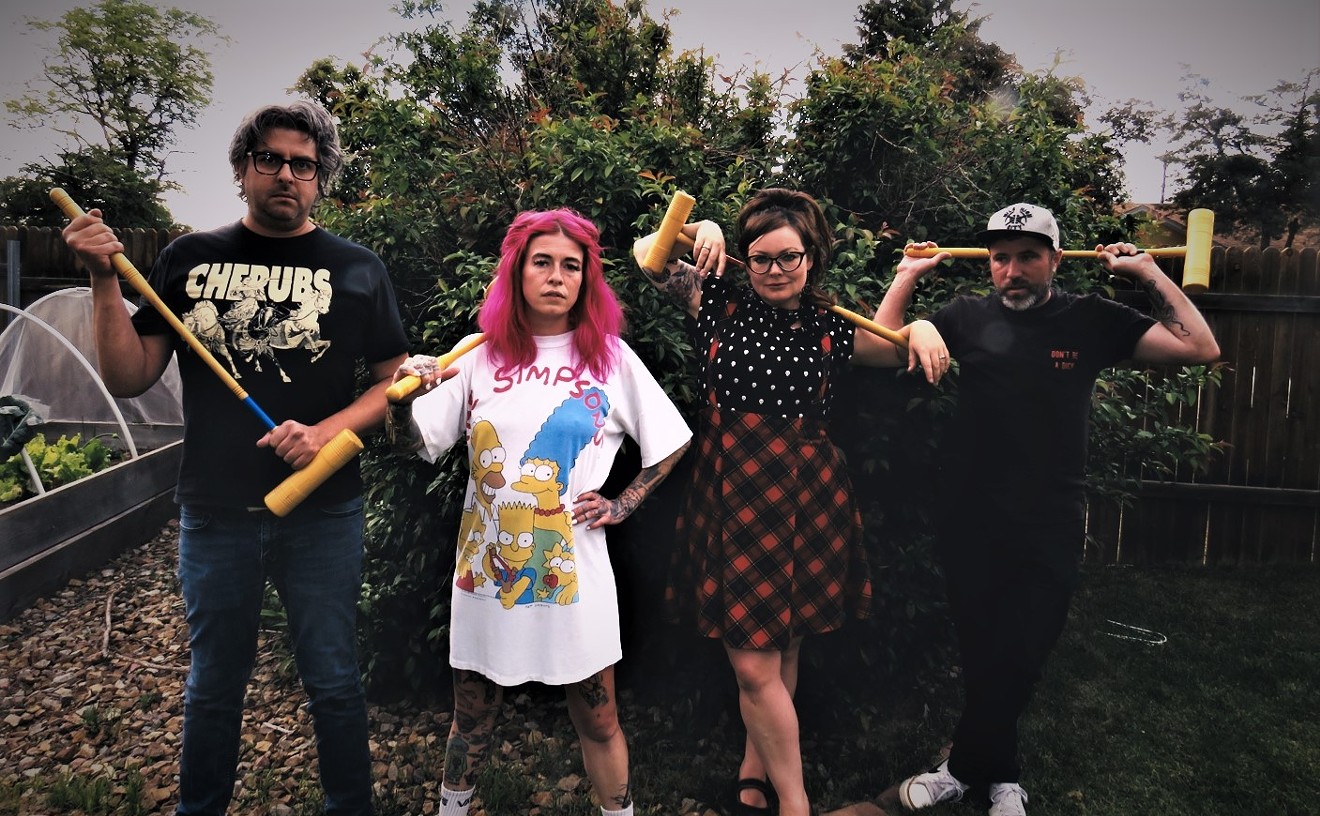Pulling from a variety of sounds, musical genres and ideas, Monáe has actualized a personal mythology of creating a more vibrant, compassionate, inspiring and free future for all humanity. You can immediately draw a comparison between Monáe's richly imagined music and performances and Sun Ra's flair for the theatrical, what Prince did in the '80s, what Funkaldelic did in the '70s, and what Erykah Badu has done in the last two decades. We spoke with the intelligent and thoughtful Monáe about "the other," the ability of art to change the world and the central role of love in artistic expression.
Westword: In your music the image of "the other" figures prominently. What is it about that concept of "the other" that stirs your imagination?
Janelle Monáe: Well, I think that right now we're dealing with a lot of minorities in different parts of the world who feel like "the other." I think it's a relatable term. I think we will have a new species of "the other," which is the android, that will live amongst us. And I think speaking about the future gives us a chance to correct history, especially the negative things that have happened like oppression and slavery of "the other." That's why I sing about "the other" -- because I want to keep people thinking about that and why we consider certain people to be "the other" and why certain minorities feel like "the other." I think this discussion will help us get closer to uniting as a whole.
Why do you feel music still has the potential to change the world even in the environment we're in now both socially and politically?
I think artists are the pioneers in helping to change the world. Their ideas can stretch long and wide. I think art and music brings people together. I think the more that you can get people's minds and hearts involved in what you're doing, I think you have the power to give them a different perspective on life, a different outlook on life. I think that's where you start and I think that starts with the artist and what he or she thinks his or her responsibility and message is.
Would you say that the movie Metropolis and other hopeful, dystopian science fiction had an impact on the aesthetic of ArchAndroid?
Yeah, Metropolis being the godfather of all science fiction movies, sure. And Octavia Butler's Wild Seed and my own science fiction theories -- just my own imagination.
What is it about the mythology of The Wizard of Oz that most strongly resonates with you?
Everybody has a journey, and I think that you can apply who your Tin Man is and who your Lion is when you're all waiting to get to this destination -- this promised land -- you meet all these people. You meet interesting people along the way who help you and some don't. I just think it's the metaphor of everybody's journey. Everybody has their Tin Man, their Lion, their Scarecrow and poppy flowers. It's like mathematics -- you plug in the variables and solve the equation. I think that's how I look at that.
How did you end up meeting Big Boi after you moved to Atlanta from Kansas?
Just like The Wizard of Oz, he was someone who was there on my journey. My journey is still continuing, but he was one of the first people I met who wanted to help me get there, and he did. He and Andre 3000 are big supporters of me, and they wanted me to be on the Outkast album. I was leaving my job at the time, and I wrote a song called "Let Me Go" and he heard it and put it out. I'll forever be thankful for him. He's like a big brother and somebody who definitely helped my career blossom.
What sorts of things most informed the creation of your stage persona?
It's nothing I could teach. I think it's something people are born with. There are artists from Prince to Stevie Wonder to Beyoncé, who have a certain thing about them. I'm using them as examples, but you don't learn how to do that. It's hard work and combination in what has been instilled in them and the spirit that comes over them when they're performing. And like them, I have the same spirit that comes over me when I perform, and I allow it to move me, and it's not as calculated as one may think. It's a very organic process for me when I'm on stage. It's about being very fearless and very free.
What can you tell me about The Red Book, in terms of your involvement in creating the text and artwork, and why you thought it important to put out a graphic novel version of ArchAndroid?
We're still working on it. We've finished the graphic novel, but we're narrowing down our partners to some really great graphic novel and comic book companies. I think it's important, because I believe in cross-pollinating, and that the people who are in love with graphic novels and comic books, I think would love the story.
The album is captured in the graphic novels in the hopes that they come and listen to the album and vice versa. It's about bringing people together -- all those worlds -- to create a full vision. You don't have to do one or the other, you can do both. I am an illustrator and I can draw but I like Chad Weatherford's drawings better. He's great, he's amazing. He also did the Metropolis and ArchAndroid covers.
When you were growing up what anime features resonated most with you, and how has that informed your current art? How did it help you to transcend the "confusion and nonsense" of the place where you grew up?
I didn't watch a lot of anime, to tell you the truth. I think it's just a part of my DNA. I live one foot in fantasy and one foot in reality, and I'm always walking that tightrope line.
You often stress how everyone can become an agent of change in their own right and in their own communities. Is there anyone who similarly inspired you as an artist to do the same?
Of course. I love what Prince is doing now. He donated a lot of the proceeds from the Welcome to America tour to schools that needed help with books and music and education. I think it's really cool what he's doing. He's at the level where he's giving back. He's also pulling artists like myself and Esperanza Spalding and other artists of this generation, that he admires and he feels people need to know about, and giving them a chance to open for him and introduce his audience to him. That, to me, is something the community needs more of, giving back and passing the torch to the next generation.
Stevie Wonder is also a person who gives and gives. I've been around him, personally. I had a chance to play a date with him. Both of those guys just give whether it's just speaking to people after the show and passing down knowledge and wisdom. All that stuff matters and resonates -- at least it resonates with me and encourages me to want to do the same.
In some interviews you've encouraged people to be individuals. What do you mean by that, and how would you encourage people to do so?
I just want people to love themselves. And I want people to seek out love. That's all. To be an individual. I can't tell people -- that's just going against it, like, "People need to be this." That's not what I'm here to do. All I'm saying is that we all have to live in the world together. Consider your brother and your sister, consider your neighbor, consider everybody's feelings. That's all. It's not just your world.
Also, acknowledging and knowing that we're not all designed the same. So be patient with each other. And, also, we are not all designed to look the same. Let's not discriminate against one another because we don't simply agree with the design of the next person. People should just love the person that God made them to be. And speaking out of love and that's it. Those, to me, would be the rules.
The people is really who I'm writing my music for. Both my parents, at one point in time, were janitors, and I've seen them go to work every single morning. I've made it my business to stay connected with the people. When I perform, I'm in the audience, I'm touching them and they're touching me. It's not a matter of superiority, and I hope to continue that as long as I live.
Follow Backbeat on Facebook and on Twitter at @Westword_Music.











